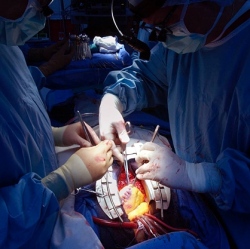
Scientists believe they have an explanation for the axiom that stress, emotional shock, or overexertion may trigger heart attacks in vulnerable people. Hormones released during these events appear to cause bacterial biofilms on arterial walls to disperse, allowing plaque deposits to rupture into the bloodstream, according to research
"Our hypothesis fitted with the observation that heart attack and stroke often occur following an event where elevated levels of catecholamine hormones are released into the blood and tissues, such as occurs during sudden emotional shock or stress, sudden exertion or over-exertion" said David Davies of Binghamton University, Binghamton, New York, an author on the study.
Davies and his colleagues isolated and cultured different species of bacteria from diseased carotid arteries that had been removed from patients with atherosclerosis. Their results showed multiple bacterial species living as biofilms in the walls of every atherosclerotic (plaque-covered) carotid artery tested.
In normal conditions, biofilms are adherent microbial communities that are resistant to antibiotic treatment and clearance by the immune system. However, upon receiving a molecular signal, biofilms undergo dispersion, releasing enzymes to digest the scaffolding that maintains the bacteria within the biofilm. These enzymes have the potential to digest the nearby tissues that prevent the arterial plaque deposit from rupturing into the bloodstream.
According to Davies, this could provide a scientific explanation for the long-held belief that heart attacks can be triggered by a stress, a sudden shock, or overexertion.
